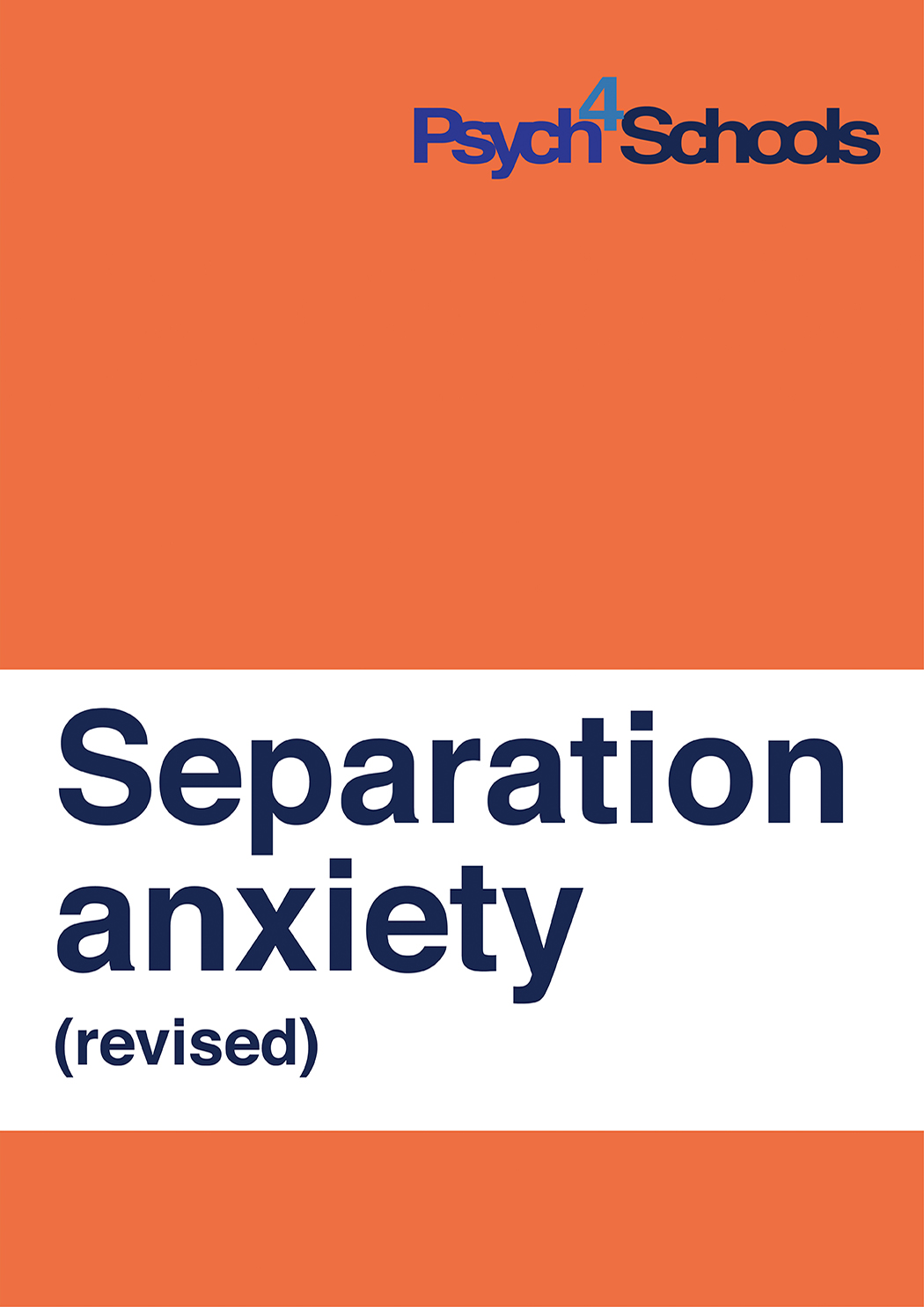Separation anxiety (revised)
The following is an excerpt from the ebooklet Working with children who experience separation anxiety (revised) by Murray Evely and Zoe Ganim.
Introduction
Children who experience separation anxiety
Separation anxiety can affect children of all ages. About four per cent of primary school age children experience excessive separation anxiety when separated from their parent or primary care giver[1] Schniering, C.A., Hudson, J. L., & Rapee, R. M. (2000). Issues in the diagnosis and assessment of anxiety disorders in children and adolescents. … Continue reading. Typically, these children persistently worry about being forgotten, or fear the parent/carer being harmed or not returning. Separation anxiety and associated fears can also be experienced in adolescence and can interfere with school attendance, learning and wellbeing.[2]Martinez, K., (2015). ‘I don’t want to go’: Understanding and helping youth with separation anxiety and school refusal. Visions: BC’s Mental … Continue reading
A healthy level of separation anxiety is part of normal childhood development and indicates the development of a close bond and attachment to the primary caregiver. It usually begins around six months of age and ends by the time children begin kindergarten, preschool or primary school.
For most children separation anxiety decreases and ceases as they gain confidence and adjust to attending school. Others will fail to adapt, leading to persisting problems separating and possible bouts of school refusal [3] ibid and other mental health issues.
Characteristics of separation anxiety
Children experiencing separation anxiety may exhibit one or more of the following when separating from a parent/carer:
- being clingy, holding on to the parent’s hand, arm, leg, clothing or hiding behind the parent
- withdrawing from others
- whingeing
- excessive shyness
- psychosomatic symptoms such as headaches, stomach aches, vomiting
- crying hysterically
- shaking with fear
- temper tantrums
- lack of trust of teacher or other school staff
- refusing to speak.
Older children and adolescents may also express fear of:
Triggers
Separation anxiety can be triggered or exacerbated by situations that children perceive to be distressing, including:
- an unexpected late pick up
- being left at school or at someone’s home
- an invitation to sleep at a friend’s house
- starting a new school
- a pending school camp
- perceived or actual lack of personal safety
- parental work trips
- parental divorce or separation
- unexpected or extended parental absence
- moving to a new house
- the birth or adoption of a new sibling or fostering of a child
- the death of a close relative, friend or pet
- experiencing or witnessing a disaster, violence or an accident.
Who is more ‘at risk’?
Parents/carers play a significant role in creating a close bond based on nurturing behaviour and emotional support from the child’s birth. A healthy attachment helps to develop the child’s capacity to separate from parents over time to confidently explore their surroundings, build a desire and willingness to do things for themselves, and to self sooth when challenges arise. Frequent short play periods together, parents/carers who ‘tune in’ through listening and talking through any fears, allowing the child to do things for themselves and creating play times with others all provide opportunities to help build age-appropriate independence. Over time, the child typically reduces dependence on the parent/carer and has less need to be physically close to them all of the time.
Excessive separation anxiety is more common in children with a parent/carer who:
- is over-protective
- misses opportunities to build the child’s confidence and independence
- focuses on negatives
- reassures excessively and gives in to the child’s demands
- has unresolved trauma or grief that still impacts on their life
- has lingering concerns about the child and their learning.
Some children have a biological predisposition to ‘fearful shyness’, a tendency to shy away from novel situations. Inhibited children are at a greater risk of separation anxiety.
Where separation anxiety arises from a parent’s own anxiety, both the parent and the child can fuel each other’s anxiety leading to a cycle of uneasiness and escalating anxiety.
Fears, worries and anxieties
From time to time, we all experience fear or worry, with many anxious moments a normal part of childhood and growing up. Many early childhood fears such as being frightened of the dark when going to bed or fear of thunderstorms are overcome with parental support. However, some fears can become excessive and interfere with a child’s confidence, and opportunities for fun and social relationships. For example, an excessive fear of dogs can cause a child to refuse to play with friends at a local playground for fear an unleashed, threatening dog may appear, or the child may constantly turn down play dates at a friend’s house for fear the family’s dog may jump up or bite. Not wanting to leave the safety of home can fuel separation anxiety.
When to seek further assistance
Any fears that become persistent, debilitating or significantly interfere with the child’s daily life, can be addressed by a psychologist. These professionals can guide parents to support their child with techniques such as systematic desensitisation where the child is exposed to the source of their anxiety in small non-threatening steps or treatments. In addition, fears, worries and anxious thoughts can be explored using Cognitive-Behaviour Therapy with rational thinking strategies to examine thinking errors and cognitive distortions that often underpin anxiety and negative thinking.
Teachers and support staff need to monitor children for patterns of anxious behaviours. Whether separation anxiety develops or emerges in primary school or in adolescence if excessive, interferes with the child’s daily functioning, and lasts for more than four weeks, it is essential that the child be referred to an appropriate professional. Separation anxiety can co-exist with generalised anxiety disorders and social phobia. Refer the child, via the parents, to a psychologist or the family doctor. Encourage the parents to follow the recommendations made by the clinician and to share appropriate recommendations with the school.
If left untreated, separation anxiety can intensify and result in difficulty making friends, concentrating and completing schoolwork; it may also escalate and result in school refusal, drug and alcohol use [6]op. cit.and other anxiety disorders in adolescence and adulthood. For information about school refusal see the Psych4Schools ebooklet, Working with children who refuse to go to school (School Refusal). Common ways anxiety can present in a child are listed in the Anxiety resources package in the Member’s Area of the Psych4Schools website under the heading, Additional information.
Strategies to support the child with separation anxiety
- Work with the child’s parents/carers. It is important to communicate regularly with the parents/carers. Develop a clear plan with the parents/carers that is appropriate to the child’s age, including a morning drop-off ritual, and parent-agreed teacher intervention if the ritual fails.
- Reassure parents/carers that the child is supported after they leave. Explain that activities and responsibilities help the child to settle in the classroom and that the child is fine shortly after the parent/carer departs.
ISBN978-1-921908-50-7
Copyright © Murray Evely and Zoe Ganim 2021
No part of this excerpt may be reproduced or reprinted without permission in writing from the publisher.
Click here to read copyright details, summary of the licence and terms and conditions to use and reproduce our digital materials granted to authorised users.
References
This article is an excerpt from the ebooklet Separation anxiety (revised)
Download the complete ebooklet for full access to strategies and resources, including:
- Support the child with separation anxiety
- Talk with the child and parent/carers about school camps
- Prevent and reduce escalating separation anxiety
- References and resources





